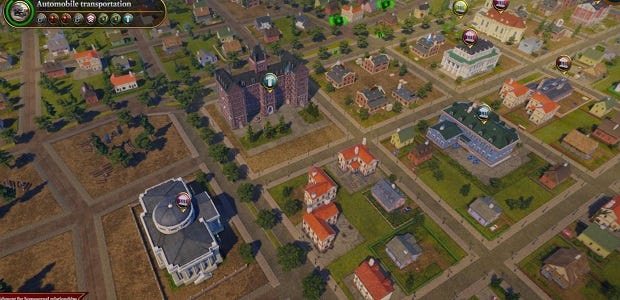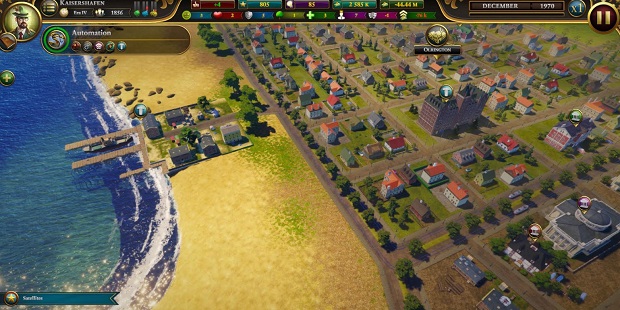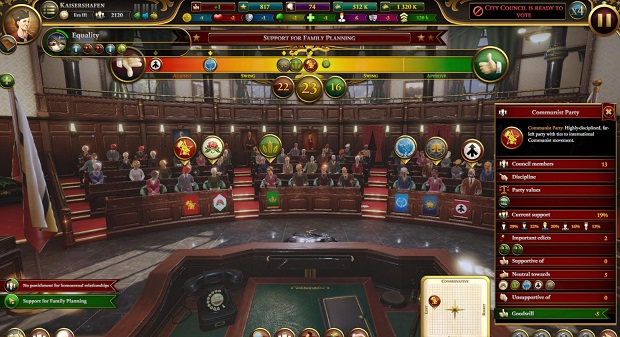Wot I Think: Urban Empire
Protest vote
Urban Empire [official site] is a city-building strategy game about politics and people rather than residential zones and monuments. Placing you as successive members of a dynasty, each acting as the mayor of a city developing against the backdrop of the previous two centuries of European history, it's about votes and influence as well as taxation and construction. But how does this more personal and political approach to urban management work? Well, it's unlikely to win the popular vote.
Contemporary strategy games are typically so obsessed with the minutiae of resource management and budget allocation that the business of leading, whether a town, a nation, or a galactic empire, often resembles the work of a lonely deskbound mathematician slaving away at facts and figures. Urban Empire attempts to place you in the role of a politician, cheerfully navigating webs of diplomatic intrigue, cajoling and backstabbing to preserve your rule, and - only if circumstances permit it - attending to the secondary task of actually improving the livelihoods of the citizens that have elected and/or tolerated you.
This focus on politics instead of city-scale bookkeeping isn't entirely novel. In the past, genre heirlooms like Balance of Power and Shadow President have catered for players who prefer their turn-based strategy with a dash of Machiavelli. What is original about Reborn Interactive's offering is the way all the scheming and negotiating, all the breakthroughs and the setbacks, are enmeshed with the personal histories of the members of the political dynasty we choose to play as during western Europe's wild scramble towards the 21st century.
Yes, Crusader Kings II has done the whole line-of-succession thing before, but these were mostly emergent narratives projected by players gently prompted via shrewdly orchestrated sets of statistics. Here, instead, there are intimate, scripted stories. As an astute commenter observed in our preview of the game, Urban Empire should ideally play like a two-hundred-year long Show Me a Hero simulator.
To keep things personal Reborn wisely opts to restrict the scale of the project. The aim of the game is to build and expand a city that connects the capital of the newly-formed Austrian Empire to the Adriatic, then retain its mayorship for the next couple of centuries, from 1820 to 2020. There are three different starting locales to found your city on and four families to play as, each with their own particular leanings: the Shuyskys, for example, start out as typical 19th-century aesthetes, wealthy art patrons with little experience in politics, while the Kilgannons are a working class lot with strong ties to labour movements.
Initial choices made, the campaign tutorial starts laying out the basic principles of building and improving your city: designing districts, outfitting them with necessary infrastructure, and providing them with the various services like schools and churches needed to keep the population happy. What the tutorial also inevitably reveals is one of Urban Empire's major flaws; a striking indecisiveness on how to divulge information. Early instructions oscillate wildly between handholding and obscurantism. At one step you're being tested on your grasp of the (entirely typical) camera controls, at the next your planned expansion is blocked because of an “illegal district shape”, even though you've gone for that paragon of Euclidean respectability, the rectangle, and there's no suggestion forthcoming on what would constitute a legal alternative.
It's hard to discern whether it's QA failure or willful obfuscation, but it's an attitude that persists throughout the game. During your research (covering both technological and social advances) you're usually presented with a number of choices on a specific focus for your current subject. Sometimes, letting the mouse pointer hover over each choice will show you their effects; sometimes it will show the effects of only one of them; sometimes you get nothing. More often than not you're left to look for contextual clues in the accompanying text, which would be fine if these were consistently available: once, while researching gas I was asked to pick a model for our street lighting between the Anglosaxon, the Parisian, and the Viennese one, without any further clarification. With little or no information to base these decisions upon, a series of choices meant to provide some colour - not to mention a sense of agency - to Urban Empire's relentless historical march, is rendered moot.
There's dubious relief to be found in the growing realisation that the effects of these decisions are trivial anyway. Urban Empire's numbers do not gel together quite as well as in other, more meticulously balanced strategy titles. There, a precarious tradeoff is taking place with every choice – you gain an advantage by sacrificing another, one that is crucially just as useful in general, only less so in your particular situation. Here, there are only two resources that count, prestige and money, and they hardly get in the way of one another, the former quietly accumulating for the rare occasions you might actually need it, the latter easily acquired by tax hikes – a strategy that members of the city council seem curiously happy to endorse, regardless of their political affiliations. Success in Urban Empire is mostly a matter of periodically raising taxes and following prompts and there's little to challenge even the observant casual player, let alone genre veterans.
Just as well then, that Urban Empire is not intended as a hardcore strategy title but as historical family drama punctuated by the double-dealings, uneasy truces, and conspiracies animating its central stage: the city hall. If, as Sid Meier would have it, a game is “a series of interesting decisions” then most of what's gamelike about Reborn's title takes place there, during the voting sessions on whatever policies you want to enact and especially on the pleading, reasoning, and even downright blackmailing immediately preceding those.
Depending on your mayor's family background and past performance you have a certain amount of goodwill with each political party which can be spent in an attempt to ensure a favourable outcome on particularly thorny issues. Watching the votes being counted on a crucial new policy or expansion proposal provides the game with its most gripping moments, especially in the early days when you've yet to grasp how to manipulate the council through use of the goodwill resource and some good old-fashioned opportunism. The secret is that, since the former tends to slowly revert to its initial value, you should be expending it periodically to push through policy changes that would otherwise be resisted. Say you have extra goodwill points with the right-leaning Moderate Party, it might be time to pass an edict on lowering the working day to ten hours. Is the liberal-minded Pacifist Party favourably inclined towards you currently? Take advantage of the opening to ban obscene comics.
On the surface Urban Empire seems to be taking its cues from titles like Civilization and Cities: Skylines but the way it deals with its central mechanic of council-chamber politicking most closely resembles the gleeful amorality of Reigns. In both games the optimal strategy requires you to navigate tensions between opposing factions, exploiting all while refraining from either alienating or getting too close to any single one of them. The problem is that while part of what makes Reigns so irresistibly addictive are its brutally high stakes, in Urban Empire there are none.
Being appointed by the emperor means your dynasty's first hundred years of rule are completely hassle-free but, even after mayoral elections are introduced, it never feels like your suddenly accountable political career is genuinely threatened. In both of my - diametrically opposed, from a political standpoint - playthroughs, the council generously kept extending my rule. The hardline conservative von Pfilzens adopted for my second run, were, somehow, the toast of both the Communist and the Central Party, not just the traditional right-wing factions. Even on the couple of occasions I managed to screw up so badly to lose an election I was allowed to overrule the result using my effortlessly acquired heaps of prestige. To its detriment, Urban Empire makes it almost impossible to lose.
The personal stories of each dynasty member and the little subplots that develop as a result of bitter family rivalries and poorly thought-out romantic choices provide some interesting subplots, but these are few and far between and never seem organically connected to the broader historical narrative. Sure, the loss of both her mother and grandmother while giving birth has shaped Elena Sant' Elias's interest in obstetrics and pro-choice attitudes, but her city never feels much different from that of any other mayor in the same period. This is true even when you try to roleplay the characters as faithfully as possible.
Perhaps that is where Urban Empire's greatest weakness lies. Reborn, rather than letting you fool around with imagined possibilities of the last two centuries of European history, seem stuck on reiterating that history. It's a choice that, perhaps, explains the game's other flaws - how its generosity allows you to flourish but obliterates the possibility of a challenge, how each playthrough feels almost identical, even with your city on a different location and ruled by a different family. Sadly, the core mechanics of the game do little to negate those flaws.
The pleasures of a focused strategy title like Civilization lie in juggling the numbers in just the right way to succeed. Those found in a freeform city-builder like Sim City come from unleashing your unbridled creativity on a blank canvas. By sticking on a rigidly deterministic (and, thus, politically questionable, however well-intentioned) reading of two centuries of European history, Urban Empire fails to tap either of those joys, revealing its incessant march towards the present is not an ongoing process actively shaped by individual players, but a foregone conclusion simply waiting to be ushered in.
Urban Empire is available now for Windows, via Steam.

















